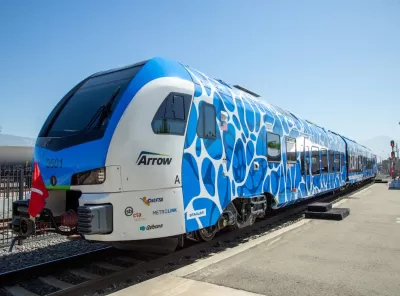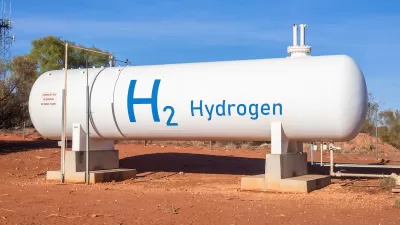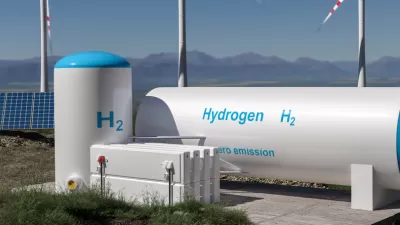The 9-mile rail line could be a welcome breath of fresh air for one of the region’s most polluted communities.

A new train in San Bernardino, California operates on a hybrid hydrogen fuel cell and battery system whose only byproduct is water vapor, reports Jules Feeney in The Guardian.
“The new technology will make Zemu the first hydrogen-powered, zero-emissions passenger train in North America to meet Federal Railroad Administration (FRA) requirements when it goes into service early next year,” Feeney explains.
The train is an experimental project, slated to run on a 9-mile route between San Bernardino and Redlands, two cities east of Los Angeles, and could pave the way for more widespread adoption of the hydrogen system. The region suffers from heavily polluted air due to its role as a major hub for distribution centers.
State transportation leaders are taking note: “After seeing the early success of the Zemu project last year, the state’s department of transportation – known as Caltrans – commissioned Stadler to build longer versions of the hydrogen-powered trains that will run between Merced and Sacramento in the Central Valley on a yet-to-be-built line. So far, Caltrans has ordered 10 units, with the option to buy 19 more under the terms of the $80m contract.”
Feeney notes that widespread use of hydrogen -powered trains will require heavy investment in infrastructure for building trains and producing hydrogen fuel, a process that requires energy itself.
FULL STORY: ‘Transformational’: how a California city launched America’s first hydrogen-powered passenger train

Alabama: Trump Terminates Settlements for Black Communities Harmed By Raw Sewage
Trump deemed the landmark civil rights agreement “illegal DEI and environmental justice policy.”

Planetizen Federal Action Tracker
A weekly monitor of how Trump’s orders and actions are impacting planners and planning in America.

The 120 Year Old Tiny Home Villages That Sheltered San Francisco’s Earthquake Refugees
More than a century ago, San Francisco mobilized to house thousands of residents displaced by the 1906 earthquake. Could their strategy offer a model for the present?

LA’s Tree Emergency Goes Beyond Vandalism
After a vandal destroyed dozens of downtown LA trees, Mayor Karen Bass vowed to replace them. Days later, she slashed the city’s tree budget.

Sacramento Leads Nation With Bus-Mounted Bike Lane Enforcement Cameras
The city is the first to use its bus-mounted traffic enforcement system to cite drivers who park or drive in bike lanes.

Seattle Voters Approve Social Housing Referendum
Voters approved a corporate tax to fund the city’s housing authority despite an opposition campaign funded by Amazon and Microsoft.
Urban Design for Planners 1: Software Tools
This six-course series explores essential urban design concepts using open source software and equips planners with the tools they need to participate fully in the urban design process.
Planning for Universal Design
Learn the tools for implementing Universal Design in planning regulations.
Ada County Highway District
Clanton & Associates, Inc.
Jessamine County Fiscal Court
Institute for Housing and Urban Development Studies (IHS)
City of Grandview
Harvard GSD Executive Education
Toledo-Lucas County Plan Commissions
Salt Lake City
NYU Wagner Graduate School of Public Service




























